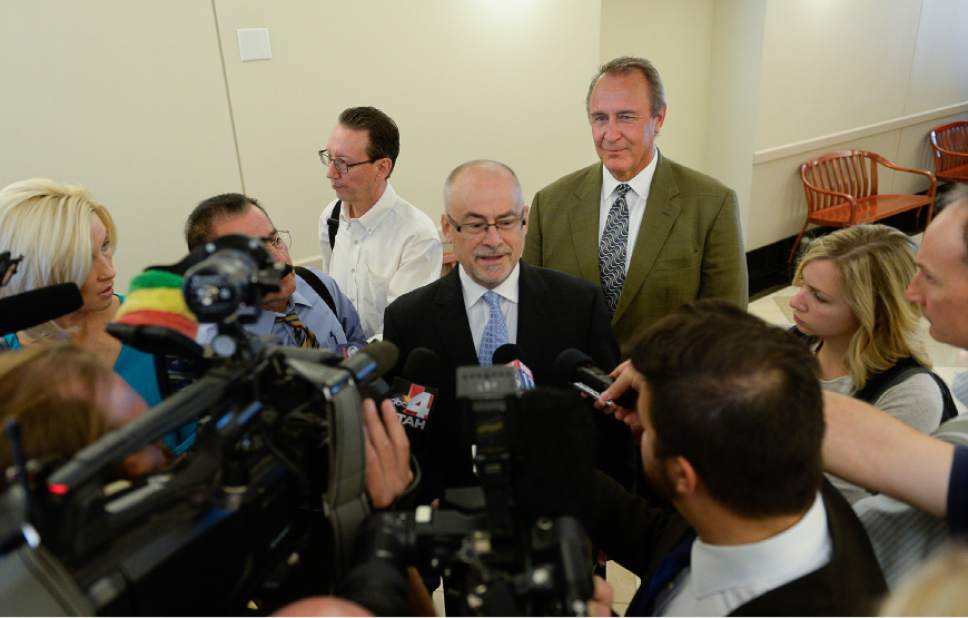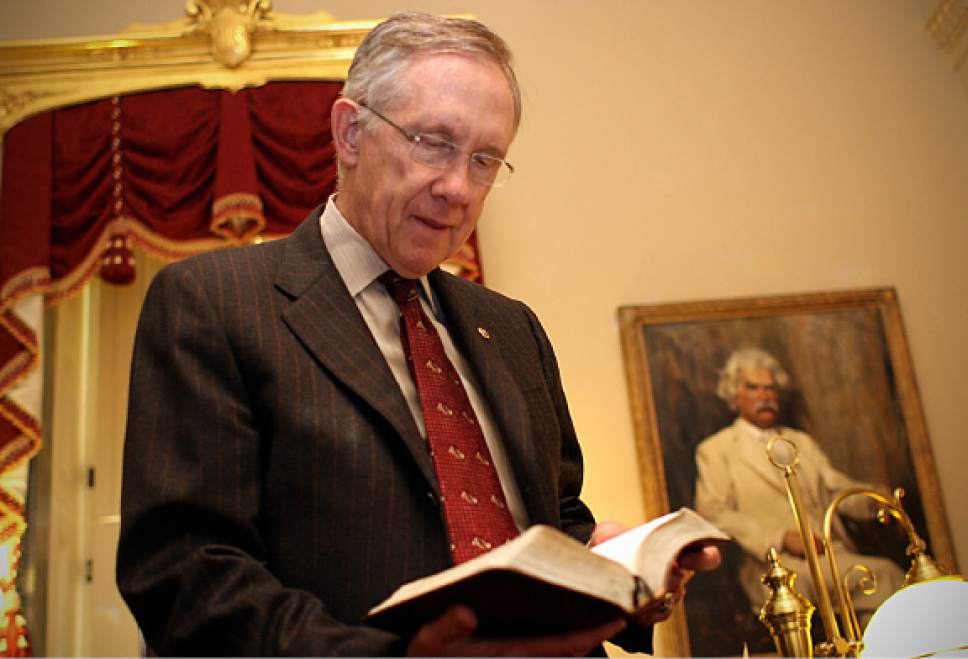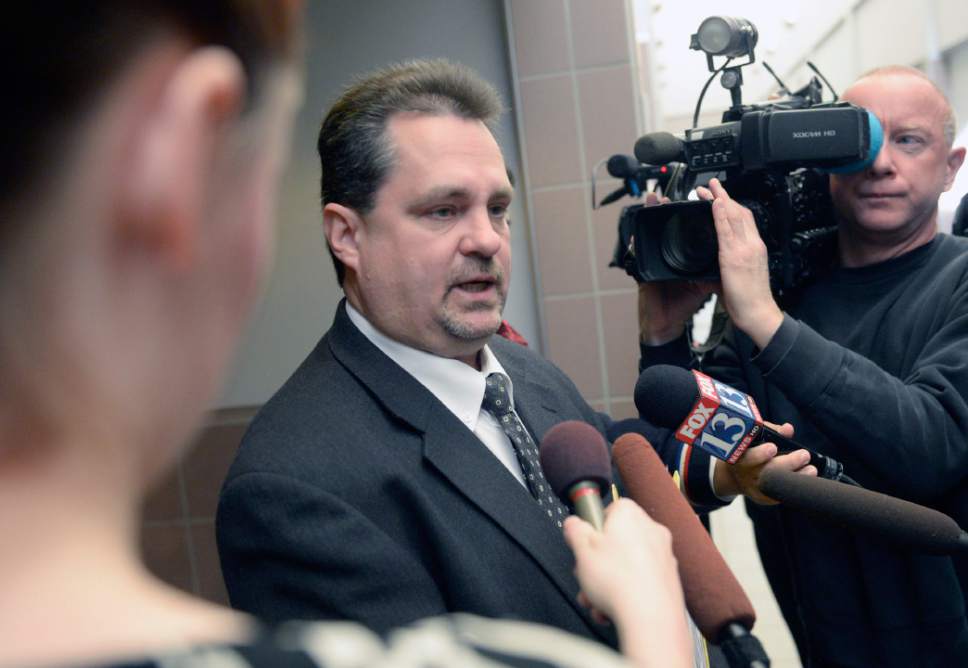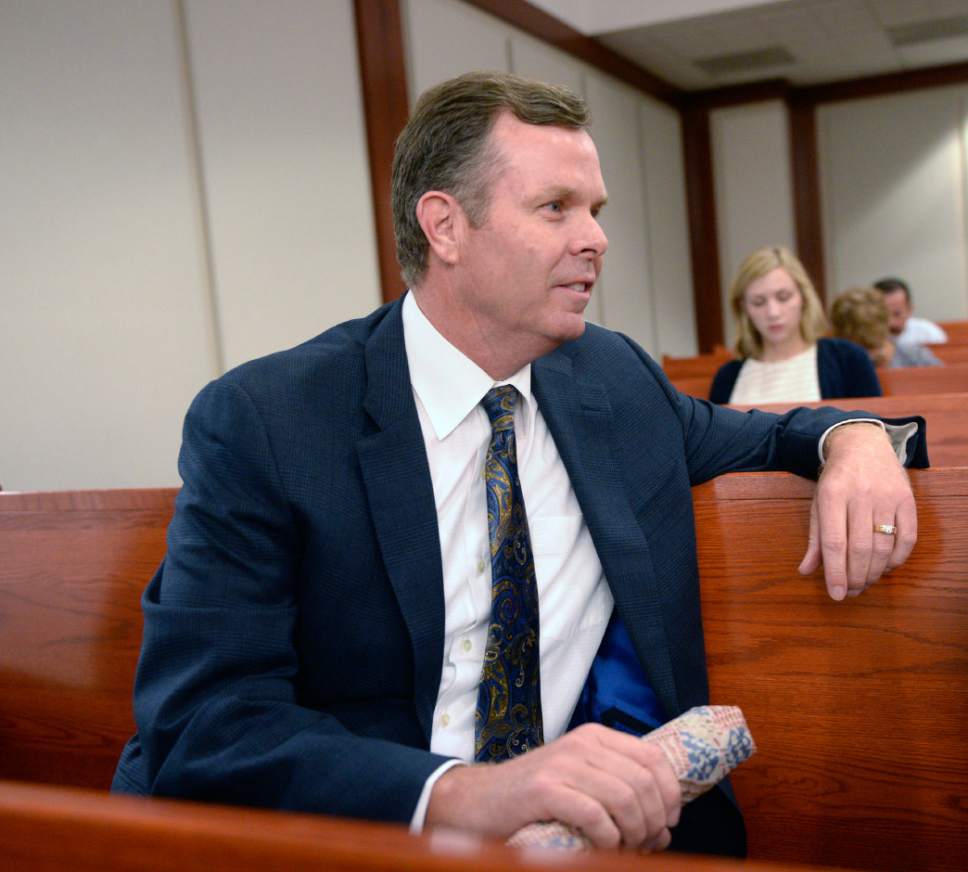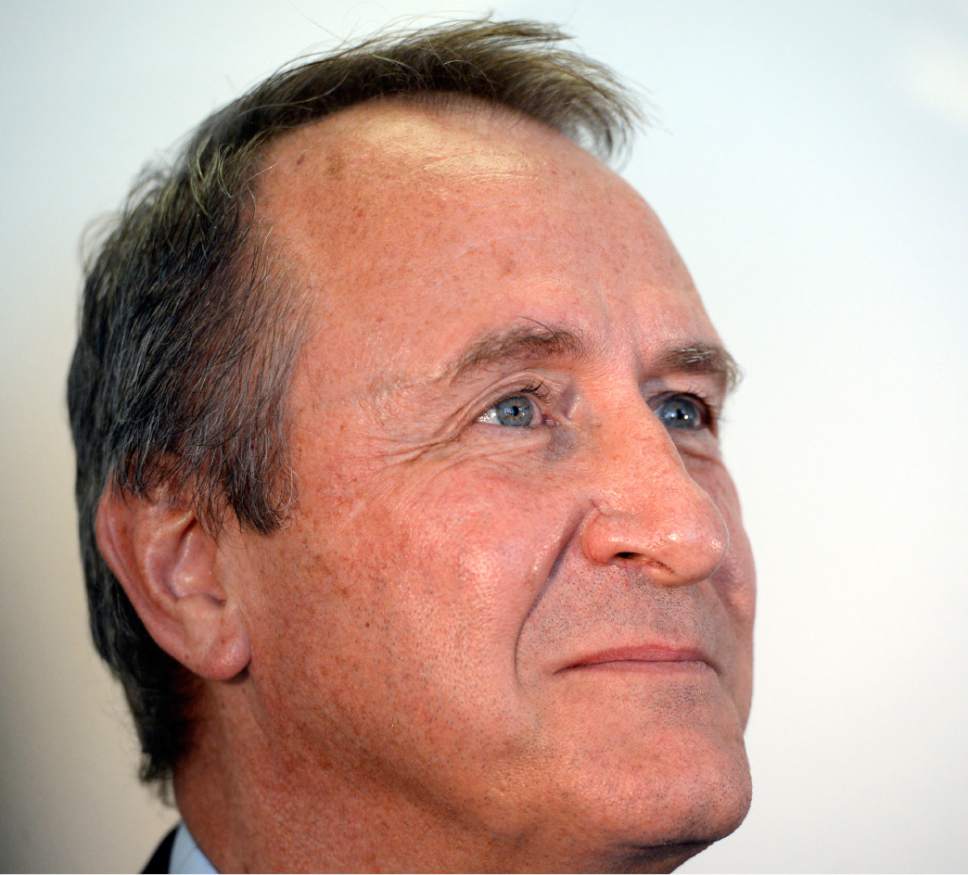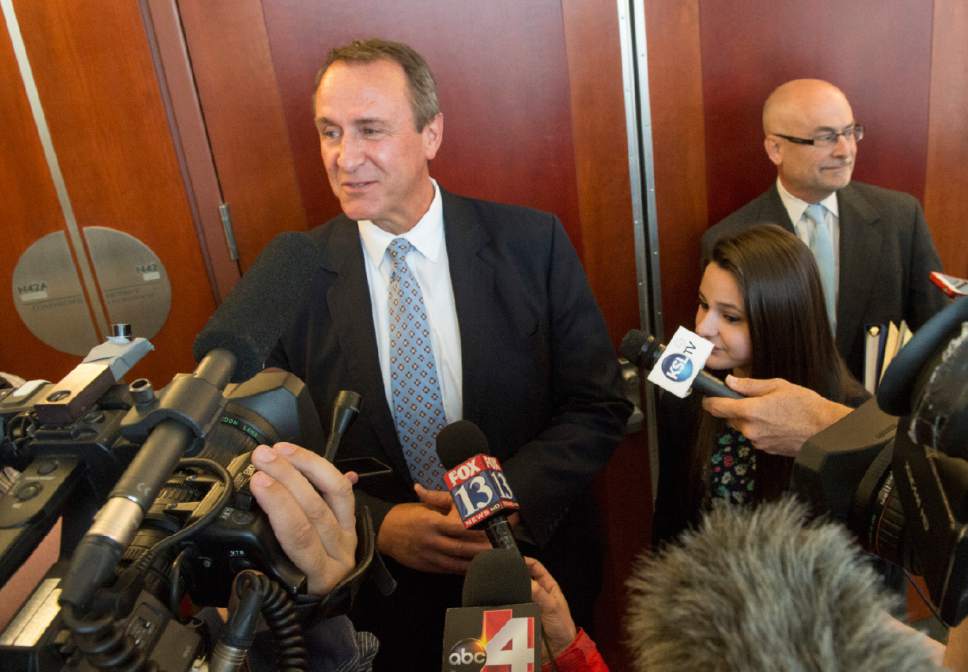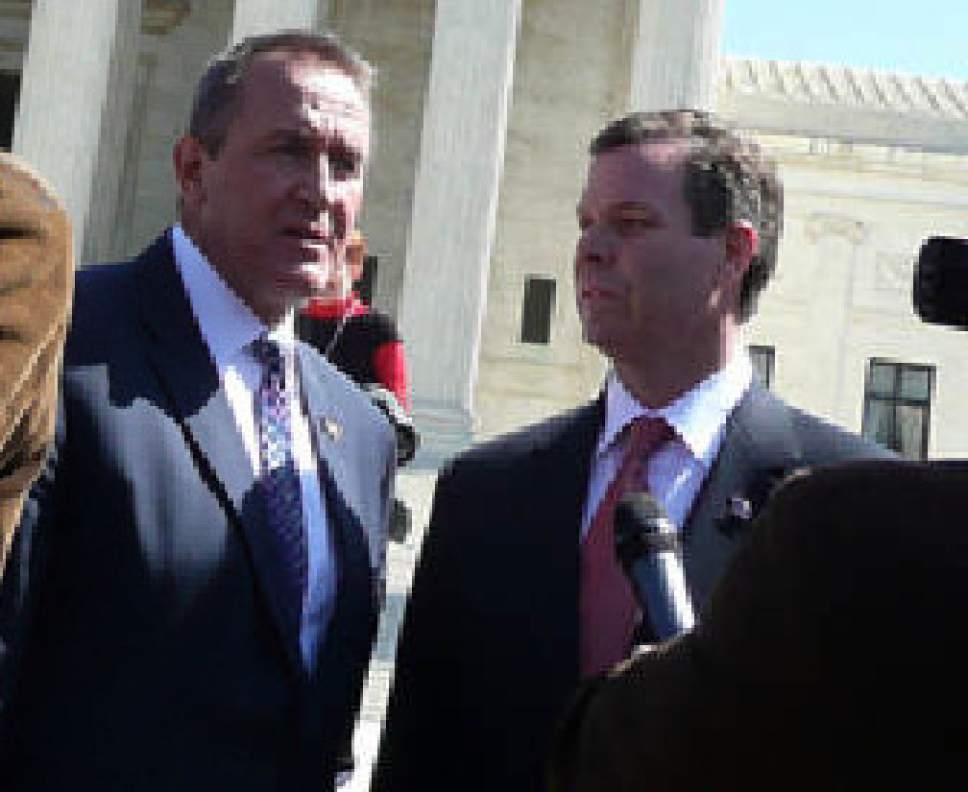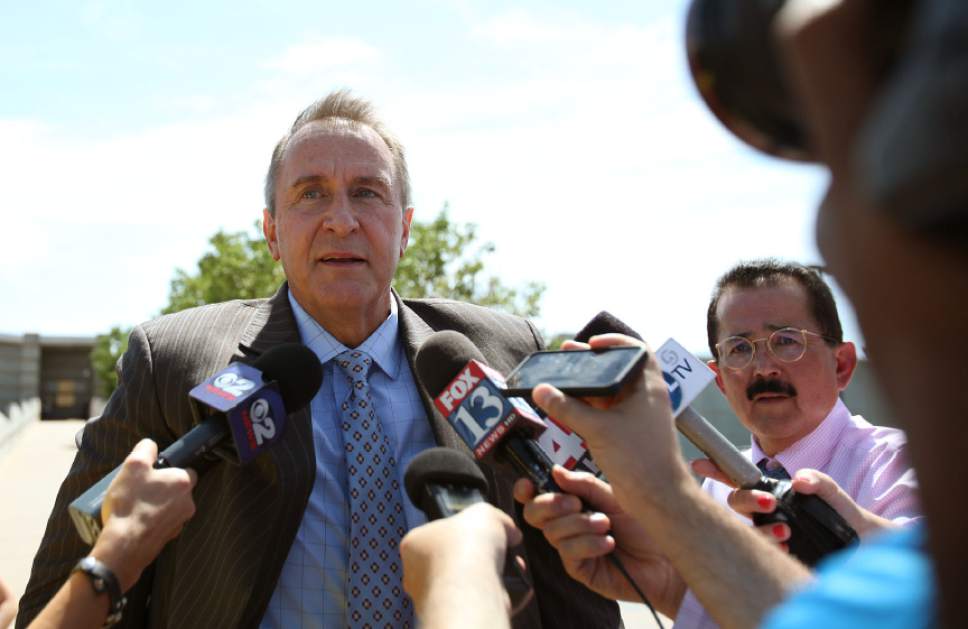This is an archived article that was published on sltrib.com in 2015, and information in the article may be outdated. It is provided only for personal research purposes and may not be reprinted.
Are federal law enforcement officials hiding something from Mark Shurtleff?
The embattled former Utah attorney general thinks so — as does Davis County Attorney Troy Rawlings, who is prosecuting Shurtleff on multiple corruption charges.
That shared belief has made Shurtleff and Rawlings unlikely allies in an effort to wrench a trove of evidence from the hands of federal officials that they believe is vital to their respective cases.
Shurtleff maintains his innocence and believes the documents may show, his lawyers say, that he was targeted for investigation after he gave federal law enforcement information about an alleged scheme to bribe then-Senate Majority Leader Harry Reid, D-Nev.
For his part, Rawlings argues the documents might help secure Shurtleff's conviction on five felony and two misdemeanor counts. But trails of statements in state and federal court filings also show Rawlings wants to pursue evidence he believes may implicate federal law officials and business and political power brokers from Utah to Washington, D.C., in possible misdeeds or cover-ups.
Federal prosecutors insist they and the FBI have turned over all the relevant material — hundreds of thousands of pages of documents.
The dispute has soured the relationship between Rawlings and federal attorneys and escalated into a legal tug of war.
At stake could be not just the criminal cases against Shurtleff and his anointed successor, former Attorney General John Swallow, but perhaps how far the prosecution of public corruption can go.
—
'The full scope' • In July 2014, Shurtleff and Swallow were charged in state court with multiple felonies and misdemeanors related to allegations of bribery and corruption inside the Utah Attorney General's Office. Both have pleaded not guilty. Each has a trial scheduled for next year.
Rawlings has declined to comment publicly, but, according to court filings, he believes that the U.S. attorney's office for Utah, the Justice Department and the FBI may be holding evidence connecting Reid to funds that flowed the Nevada senator's way from St. George businessman Jeremy Johnson and online-poker executives who were prosecuted by the U.S. attorney in New York.
Rawlings also mentions the Justice Department's Public Integrity Section, which took over the Swallow-Shurtleff investigation when the U.S. attorney's office for Utah recused itself. The Public Integrity Section eventually declined to prosecute, though the FBI continued to help when Rawlings and Salt Lake County District Attorney Sim Gill took over the probes.
Evidence provided by Johnson under an immunity agreement "clearly leads to material information in (among other places) the United States Attorney's Office for the Southern District of New York, DOJ-PIN itself and overseas," Rawlings wrote in a court document filed last week.
He and Shurtleff's lawyers are determined to pursue "the full scope of the case," and the Davis County prosecutor is unwilling to give DOJ "a mulligan" allowing it to ignore federal and state laws.
"Particularly," Rawlings wrote, "when, to their credit, local FBI agents were in tune with the overlap of the full scope, but were not able to sit down and play that grand piano, through no fault of their own."
An affidavit in a federal criminal case against Johnson also shows Rawlings is seeking information on so-called Whitewater VII, the development of a Utah Transit Authority FrontRunner station in Draper. The $65 million project became the subject of a state probe and a legislative audit after questions arose about business connections between Shurtleff supporter Mark Robbins and then-UTA board member Terry Diehl.
Diehl was cleared of accusations that he violated state conflict-of-interest laws, but Rawlings' attention to the deal could revive that investigation.
—
Same sides, different motives • Rawlings is battling the federal government on two fronts: in state court and in a sealed action in U.S. District Court to get evidence related to the state charges against Shurtleff.
In September, he filed a motion in the state criminal case asking the judge to order the feds to turn over evidence.
Shurtleff attorney Richard Van Wagoner joined in that motion. He suggests the charges against his client may be tainted by federal actions in 2007 and 2012.
Three years ago, Van Wagoner notes, Shurtleff told the feds of an effort by Swallow to help Johnson enlist Reid's clout in stalling a Federal Trade Commission investigation of the St. George businessman's I Works online-marketing company.
Johnson told Shurtleff about Swallow's ties to the Reid overture — which Johnson has cast as a "bribe" and Swallow has labeled "lobbying."
"The information Mark gave to the FBI was: Someone had told him what certain people had previously done and what others were doing in an attempt to influence Reid," Van Wagoner said in a statement. "This information, if true, did not pass Mark's smell test, and he thought the FBI would want to know and investigate."
Now, Van Wagoner argues, "Shurtleff is entitled to all information relating to what the FBI and the DOJ did or failed to do in follow-up to the information he provided concerning the possible bribery of a United States senator and what bearing that had on this prosecution and the FBI's reaching its hand from the grave after the Public Integrity Section said 'no.' "
Reid's office has denied any knowledge of the scheme.
Van Wagoner also points to a 2007 FBI sting operation in which Shurtleff acted at as a confidential informant. The attorney general secretly taped two meetings with Paul Nelson, then head of security for another embattled businessman, Marc Sessions Jenson, and who Shurtleff said had tried to bribe him.
Nelson met with Shurtleff while Shurtleff was hospitalized after a motorcycle accident and again at the home of the attorney general's parents. Nelson never was charged.
In essence, Van Wagoner is seeking a connection between these 2007 and 2012 encounters and the 2013 recusal of the U.S. attorney's office from the Swallow-Shurtleff investigation.
Van Wagoner said documents show that the U.S. attorney's office was "conflicted" and "therefore 'walled off' from any investigation or prosecution of Mr. Shurtleff" because of "circumstances" dating to 2007. The exact nature of that conflict, he added, has never been disclosed.
The defense lawyer also asserts that "significant overlap" exists between the FBI agents who worked the "bribery sting" and those who assisted Rawlings and Gill in their joint inquiry.
He wants to know why the FBI continued to assist county prosecutors after the U.S. attorney's office in Utah stepped aside and the Department of Justice's Public Integrity Section opted against pursuing charges against Shurtleff and Swallow.
Claims that the FBI already has turned over hundreds of thousands of pages of relevant documents and electronic records miss the mark, according to Van Wagoner, who insists much of the material is irrelevant or in formats that cannot be electronically searched.
—
Role reversals • Rawlings maintains the FBI gave up the right to hide behind federal rules when it agreed in 2013 to continue to work with state prosecutors.
He also has said that a sealed federal court order issued by a judge in September 2013 mandates cooperation and information sharing.
Rawlings has called on the Justice Department to join him in asking for the order to be unsealed so that the state judge, who will hear arguments on the issue Dec. 1, can make an informed decision.
Gill, whose office is prosecuting Swallow, has not sought the same cache of documents from the FBI and said his office has "no reason to think we haven't received the documents we need."
And while the Swallow and Shurtleff cases may have some overlap, Gill said, they also differ, so each office may have different needs.
"We have two very different types of prosecutions that are occurring here," Gill said. "The nexus and the issues may be issues to [Rawling's] case, and may not have relevance to mine."
The actions of Swallow's newly hired attorney, Scott C. Williams, however, could force Gill to change direction.
Hired just last week, Williams said Friday that his initial review of the case indicates that principles outlined by Rawlings in Shurtleff's prosecution also apply in Swallow's.
"The discovery issue is identical in constitutional importance, in scope and in procedural ramifications," he said. " If the Salt Lake County District Attorney's Office does not seek it in parallel fashion to the Davis County Attorney's Office, then I will."
Federal attorneys, who declined to comment on the dispute, have argued in court filings that they cannot hand over all the materials sought by Rawlings without requiring him to justify each specific request. Additionally, the feds want Shurtleff's defense team to provide proof of the relevance of the material so that they can decide what evidence he's allowed.
"It's a classic case of the fox guarding the henhouse," Van Wagoner said.
To have state and federal prosecutors warring over the release of documents is unusual — typically they're on the same side — and the impasse raises a host of issues, said Salt Lake City defense attorney Clayton Simms.
"Probably the concern from the state prosecutors is, 'What if we secure a conviction and then something comes out later that undermines that conviction?' " he said. "I'd want to know 100 percent of what's out there, whether it could help or hurt."
Failing to secure all the evidence also presents prosecutors with a potentially larger legal problem, Simms said. Court rules and the Utah Constitution require prosecutors to obtain — and provide to the defense — all relevant evidence so that accused parties can mount their defense.
If a prosecutor cannot do that, Simms said, it can leave the door open for a defendant to seek a dismissal, create reasonable doubt in the minds of a jury at trial or provide an avenue for appeal.


